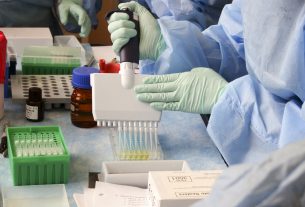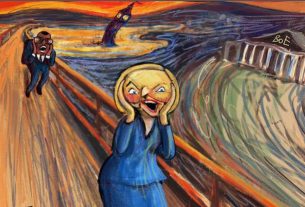Nicola Sturgeon’s handling of the coronavirus crisis is being credited as the key factor behind the surge in support for Scottish independence.
Three times as many people believe Scotland’s first minister has done a good job in managing the pandemic compared to the UK prime minister Boris Johnson.
The news comes as Sturgeon faces calls from Scottish Tories to condemn “disgraceful” protests at the border between England and Scotland that saw “nationalists in hazmat suits” urging “English visitors to stay away”.
‘Keep Scotland Covid free’
A small number of nationalists wearing PPE gathered at the border yesterday (Saturday) and unfurled saltires, SNP flags and a banner stating: “Keep Scotland Covid free”.
Jackson Carlaw, the Scottish Conservative leader described the scenes as an “absolute disgrace” and called on Sturgeon to follow other senior SNP politicians in condemning the protest.
“I really do hope even belatedly, she will come out and stop that kind of rhetoric and language,” said Carlaw. “We need people to come safely to Scotland to visit and to stay here on holiday and we should be encouraging that, not trying to put people off.
“These [images] send a message out, and we need to do everything we can to support our industry as best we can.”
Petition to close England-Scotland border
The question of whether Scotland should quarantine visitors from England has grown louder all week and a petition calling for the border to be closed for all but essential traffic has garnered thousands of signatures from Scottish residents.
On Friday Sturgeon said the prevalence of Covid-19 in Scotland was five times lower than in England and this morning, the SNP’s Westminster leader Ian Blackford told Sky News that travel may have to be restricted to preserve Scotland’s lower rate of infection.
“The fact is, you can see the prevalence rate here [in Scotland] is much lower [than in England] so we need to look at those coming in here and the kind of risks that are there, but any decisions that will be taken by the Scottish government will be based on the scientific advice that we get and keeping people safe,” said Blackford.
Support for independence surges during lockdown
Both Blackford and Sturgeon will be buoyed by findings published today by the Sunday Times that shows support for Scotland’s independence “has jumped to the highest level recorded by a Panelbase poll.”
Support has surged 5% in the three months since the previous Panelbase poll – corresponding with the lockdown – and shows that 54% now back independence, putting the SNP on course for a huge landslide in next year’s Holyrood elections.
Another big win for the SNP in the May 2021 Scottish parliament elections will strengthen their demands for a second referendum and increase pressure on Downing Street to allow it. However, Johnson has repeatedly ruled-out permitting another vote on Scotland’s future in the Union given the previous “once in a generation” referendum was held in 2014. Keir Starmer has also voiced his opposition to a second ‘Indy-ref’.
In December, Sturgeon wrote to the then-newly elected prime minister Johnson demanding a Section 30 order which would give the Scottish parliament at Holyrood the power to conduct a second vote on independence.
Sturgeon’s rating is +60, Johnson’s is -39
Johnson’s historic landslide win secured him an 80 strong majority at Westminster but the Tories performance was bettered by Sturgeon’s SNP in Scotland where the party won 48 out of the 59 Scottish constituencies – equating to an incredible 80% of the Westminster seats contested.
The following months have seen the fortunes of both leaders differ markedly, especially north of the border where, the Sunday Times’ poll shows, Sturgeon enjoys an approval rating of plus-60 for her handling of the pandemic – Johnson’s rating is minus-39.
“Never before have the foundations of public support for the Union looked so weak,” said Strathclyde university professor of politics John Curtice. “Unsurprisingly, for many nationalists, the past three months have exemplified how Scotland could govern itself better as an independent, small country.
“More importantly, it may have persuaded some former unionists of the merits of that claim, too.”




